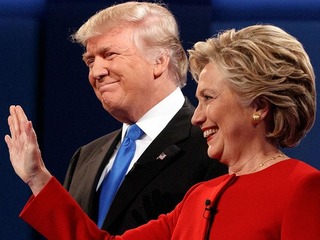The FDA outlines draft guidance on AI for medical devices
The agency also published draft guidance on the use of AI in drug development
Read more...
I have long thought that television has been a curse on our politics, turning important issues into a spectator sport. Today it seems that it's more important for some politicians to have their faces broadcast on television, rather than have good ideas to help their constituents, or anyone, for that matter.
TV, of course, loves conflict and big personalities, so the more outrageous the politician is, or the more inflammatory their rhetoric, the more airtime they get.
I think we saw this exact scenario play out in the presidential race last year, where a candidate like Jeb Bush couldn't pay the networks to put him on air, while Donald Trump got billions in free airtime. Clearly, Trump isn't the most eloquent and polished politician. But his loudness makes up for what his lack of experience.
Now social media has become the new way for politicians to get noticed and, it turns out that it's working much the same way as the old medium, a new study by Pew on Monday found.
According to Pew, it's actually the most partisan politicians that get the most followers on Facebook, with the most liberal and most conservative House members having a median of 14,361 followers as of July 25, compared with 9,017 followers for those who would be considered moderate.
In the Senate, the numbers were even higher: 78,360 for the most partisan members, while moderates had 32,626. On the left, that would be Elizabeth Warren and Bernie Sanders, with 3.1 million and 7.3 million, respectively. On the right, Ted Cruz and Rand Paul each have 2.1 million followers.
Compare that to Susan Collins, who has 47,000 likes and Chuck Schumer, who was 355,000, and you can see big the divide is between those more willing to throw bombs and those more willing to work with the other side.
On the one hand, some may find this to be a bit surprising, considering how people say they feel about politics on their feed. A Pew survey from last year showed that only 20 percent said they liked seeing a lot of political posts on their feed.
It's likely that a more accurate way to view it is that people don't like to see viewpoints other than their own. In that same survey, more than half said that opposing viewpoints "stressful and frustrating," while only 35 percent said that they find encountering ideas different than their own "interesting and informative."
"It’s not clear exactly why more-ideological members have more page followers than moderates. But a February Pew Research Center analysis of Facebook posts shared by members of the previous Congress found that very liberal or conservative lawmakers were more likely to share content that expressed indignation or disagreement on political matters, and that such posts drew more engagement online," Pew wrote.
Basically, people want to have their own views reinforced, and they tune out those they disagree with in favor of the politicians most likely to channel their feelings.
It's hard to see this as a good thing for the future of discourse in America, or for our ability to solve big problems, as studies have already shown that politics on social media, rather than fostering debate, just helps divide people further.
A study by social media marketing website Rantic last year found that only six percent of Republicans say they've ever changed their minds because of a Facebook post, and only eight percent of Democrats.
That is despite the fact that 39 percent of Republicans, and 34 percent of Democrats, admitted to posting about their political views. Only 26 percent of Independents said they had.
According that that survey, it's Democrats who are most likely to get rid of someone because of a political post, with 18 percent admitting they did that, compared to 12 percent of Republicans.
Much like the advent of partisan channels like Fox and MSNBC, social media is allowing people to retreat into their political bubbles, where news and voices they don't like can easily be silenced. The loudest voices continue to be amplified, and people are only driven further apart.
(Image source: whartonmagazine.com)
The agency also published draft guidance on the use of AI in drug development
Read more...The biggest focus areas for AI investing are healthcare and biotech
Read more...It will complete and submit forms, and integrate with state benefit systems
Read more...

